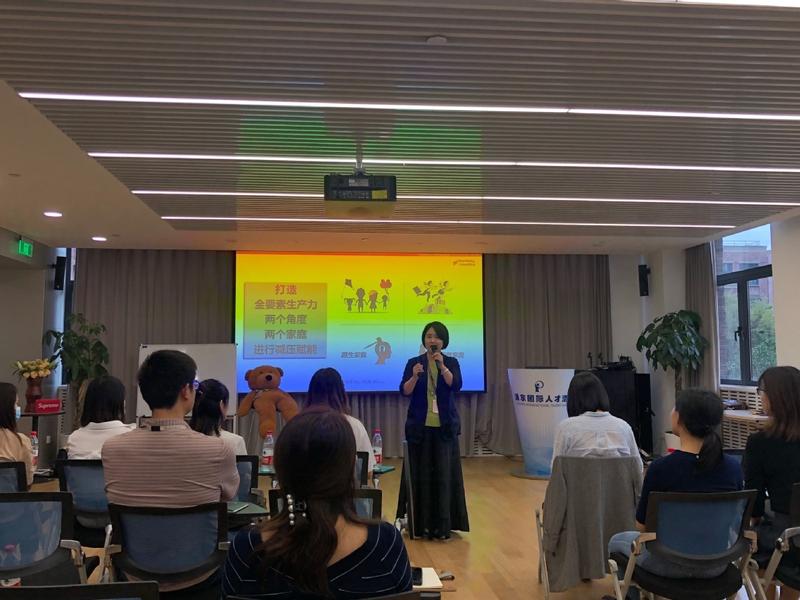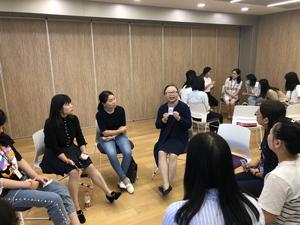Counseling providers see surge in corporate business
 Fan Yao, a partner with Harmony Consulting in Shanghai, tells human resources managers how to help employees with their mental health and increase productivity at work. (ZHOU WENTING / CHINA DAILY)
Fan Yao, a partner with Harmony Consulting in Shanghai, tells human resources managers how to help employees with their mental health and increase productivity at work. (ZHOU WENTING / CHINA DAILY)
When psychologist Fan Yao first met sales specialist Carol, she was a little intimidated by her "fierce" personality.
Unlike her colleagues, Carol-not her real name-appeared to be challenging other people, rather than being friendly.
Over the past five years, Carol had been relocated to seven positions in various departments at a Shanghai company specializing in knowledge services. She had difficulty dealing with each of her bosses.
She quickly attracted Fan's attention after her employer approached the psychologist's team in May to provide services to the company's staff members.
Many counseling providers said they have witnessed a surge in business this year from corporate clients placing increased emphasis on employees' psychological health.
Fan, a partner with Harmony Consulting, which specializes in psychological counseling, said, "A growing number of employers have begun to realize that when they hire someone, they not only hire their working ability and intelligence-they also need to consider their physical and mental health outside working hours and any influence their families may have on them.
"When employees' mental health is better looked after, their work efficiency improves and they are more committed. As a result, an enterprise's entire productivity is enhanced."
According to experts, the COVID-19 pandemic, which has seen people from different fields experience sudden changes to their lives, has stressed the need for psychological health more than ever, as this has been underestimated for years.
Data from the National Health Commission's Disease Prevention and Control Bureau show that by the end of 2017, one in every 13 people in China had mental disorders. These included depression, phobias and anxiety. Only 20 percent had sought medical advice.
Experts believe that the proportion of those with such disorders this year will be far higher, with companies, families and society facing unprecedented pressure from the pandemic.
 HR managers attend a session organized by Harmony Consulting. (ZHOU WENTING / CHINA DAILY)
HR managers attend a session organized by Harmony Consulting. (ZHOU WENTING / CHINA DAILY)
In late February, psychological counseling providers noticed a surge in their business among multinational companies-initially those involved in the medical and manufacturing fields.
Fan said that in the third quarter of this year, business at her company from corporate clients rose by nearly 70 percent year-on-year.
Lin Zi, deputy chairwoman of the Shanghai Psychological Counseling Association and founder of a domestic psychological counseling company in her name, said that from February to September, 20 enterprises became new clients in order to provide employee assistance, while many existing clients asked for an upgrade in services.
Counseling providers said they offer online and offline sessions to company workers, along with indoor sports and music, to help keep them happy. They also keep a close eye on employees to see if they need extra help.
The plight of Carol, who is in her 30s, was discovered in this way.
She said she was annoyed by her bosses. She was also aware that she had had a difficult relationship with her mother since she was a teenager, but did not relate this to the situation with her bosses.
After several weeks of heart-to-heart discussions with Carol, Fan found that the root of her problems was a repressive upbringing, which led her to automatically resist all types of authority.
"Everyone knows that after they take a walk outdoors, they may be left with some dust on their face, but they need a mirror to locate it. We, as counselors, act as the mirror," Fan said.
Carol said, "It was hard for me to accept that the situation was caused by my own problems, but I gradually began to do so, as I was eager for a better quality of life and a more pleasant work environment."
Fan spent two months talking, meditating, recalling childhood experiences and reaching agreement with Carol, who said that she increasingly opened herself up during this process.
 Rhythm dancing to relieve pressure is learned by HR managers during an event organized by Harmony Consulting in September, 2020. (PHOTO PROVIDED TO CHINA DAILY)
Rhythm dancing to relieve pressure is learned by HR managers during an event organized by Harmony Consulting in September, 2020. (PHOTO PROVIDED TO CHINA DAILY)
Carol was also taught professional psychological methods to relieve pressure-including meditation, drawing and dancing.
She gradually began to change her behavior, started to wear makeup and softened her tone when talking to others.
"I no longer felt that other people's words were offensive, and I stopped replying in an aggressive manner. Even the relationship with my mother improved," she said.
Colleagues said that due to her progress, it was difficult to relate to Carol's former personality.
By the end of last month, she had met her sales target for the entire year.
Lin said difficulties between an employee and his or her boss often reflect a problematic relationship with parents.
"A difficult relationship between a man and his father usually explains a bad relationship with his boss, and that between a woman and her mother frequently results in a poor relationship with the employee's superior.
"Such a female employee may often view well-intentioned comments made by her superior as finding fault with her," she said.
With professional guidance, the employee may eventually realize that a problematic relationship at work may be the result of unresolved family difficulties. A superior will also understand that the worker's behavior is not intentionally directed at him or her, but stems from domestic problems, Lin said.
"Through counseling both sides, we help improve the relationship within a team, resulting in smoother communication and increased work efficiency," she added.
She also said that due to confidentiality, companies are never told which of their employees have asked for help.
"However, we provide monthly, seasonal and annual reports to show clients the percentage of their employees who have consulted us about marital, interpersonal relationship and other problems, to help companies resolve such difficulties and ultimately boost their performance," Lin said.
 Rhythm dancing to relieve pressure is learned by HR managers during an event organized by Harmony Consulting in September, 2020. (PHOTO PROVIDED TO CHINA DAILY)
Rhythm dancing to relieve pressure is learned by HR managers during an event organized by Harmony Consulting in September, 2020. (PHOTO PROVIDED TO CHINA DAILY)
Work-life balance
Some employees' behavior, such as refusing to work as a team, always being jealous of others, and the desire to attract attention among their peers, can be a sign that they may need professional psychological assistance. They could be experiencing stress, not only from their own families but also from their partners.
In recent months, due to the pandemic, the children of countless workers have taken online classes.
Lin said: "Many employees who returned to the office for work said they felt a strong sense of guilt toward their children. Compared with their peers working from home, they said they could not help their children with their studies and daily life."
In addition to children's education, experts said support for elderly parents, along with marital relationships, are other factors that could result in anger at work.
Human resources executives said the solution to helping employees manage family stress is to respect their domestic situations.
Zhao Yiyang, a human resources manager at the Shanghai branch of Cooper Standard, a United States company that supplies automotive systems and components, said: "When employees' time with their families is squeezed due to work commitments, they may easily become stressed and anxious about caring for their elderly parents and their children. Their relationship with their spouses may also be challenged."
Most workers at Cooper Standard in Shanghai are not locals, Zhao said. Many are concerned about their parents and children back home. So, on their birthdays, the company sends them presents and organizes family days and trips to enable them to integrate into the corporate culture.
For employees who need to care for their families immediately, the company encourages them to take annual leave or time off in lieu to go home to deal with emergencies before returning to work, she said.
"We are clearly aware that only when there is a work-life balance can the two sides support each other and promote an individual's holistic growth, instead of producing negative influences or interference," Zhao said.
Research conducted with telecoms employees in the United Kingdom for six months by Oxford University's Said Business School found that the workers are 13 percent more productive when they are happy.
One of the research leaders, Jan-Emmanuel De Neve, associate professor of economics and strategy at the school, said, "We found that when the employees were happier, they worked faster by making more calls per hour, and, more important, converted more calls into sales."


